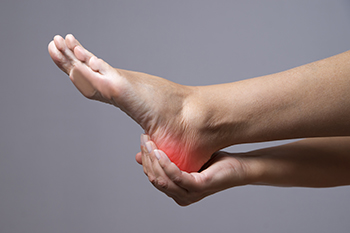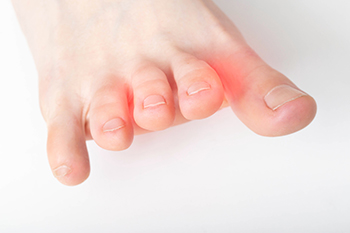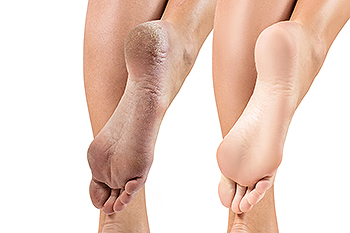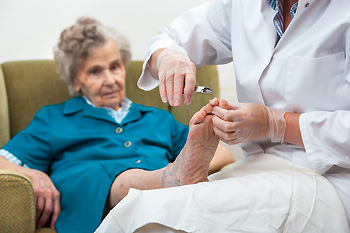Garner (919) 661-4150
September 2024
What Are Heel Spurs?

Heel spurs are bony growths that form on the underside of the heel bone, often resulting from long-term strain on the foot’s ligaments and tendons. They can be quite painful, typically resulting in a sharp, stabbing sensation in the heel, especially with the first steps in the morning or after prolonged periods of rest. Symptoms also include tenderness and swelling around the heel area. Treatment options for heel spurs include wearing supportive shoes with cushioned insoles, performing stretching exercises to alleviate tension in the foot, and using orthotic devices to correct alignment issues. In some cases, pain relief or anti-inflammatory medications may help manage discomfort. If you think you have heel spurs, it is suggested you make an appointment with a podiatrist who can provide a personalized treatment plan and address underlying issues.
Heel spurs can be incredibly painful and sometimes may make you unable to participate in physical activities. To get medical care for your heel spurs, contact Chukwuma Ukata, DPM from Advanced Carolina Foot and Ankle Center. Our doctor will do everything possible to treat your condition.
Heels Spurs
Heel spurs are formed by calcium deposits on the back of the foot where the heel is. This can also be caused by small fragments of bone breaking off one section of the foot, attaching onto the back of the foot. Heel spurs can also be bone growth on the back of the foot and may grow in the direction of the arch of the foot.
Older individuals usually suffer from heel spurs and pain sometimes intensifies with age. One of the main condition's spurs are related to is plantar fasciitis.
Pain
The pain associated with spurs is often because of weight placed on the feet. When someone is walking, their entire weight is concentrated on the feet. Bone spurs then have the tendency to affect other bones and tissues around the foot. As the pain continues, the feet will become tender and sensitive over time.
Treatments
There are many ways to treat heel spurs. If one is suffering from heel spurs in conjunction with pain, there are several methods for healing. Medication, surgery, and herbal care are some options.
If you have any questions feel free to contact our office located in Garner, NC . We offer the latest in diagnostic and treatment technology to meet your needs.
Causes and Relief of Foot Neuromas

A neuroma in the foot known as Morton’s neuroma is a painful condition that occurs when the tissue surrounding one of the nerves leading to your toes thickens. This happens between the third and fourth toes and can feel like you are standing on a pebble or have a fold in your sock. Symptoms include sharp, burning pain, tingling, or numbness in the affected area. Neuromas are often caused by repetitive stress or irritation, typically due to wearing tight shoes or high heels, which compress the nerve. Relief options vary depending on the severity of the condition and may include changing footwear or using orthotics to relieve pressure. In more severe cases, corticosteroid injections or surgery to remove the affected nerve may be necessary. If you have foot pain that seems like a neuroma, it is suggested that you consult a podiatrist for a proper diagnosis and to prevent the condition from worsening.
Morton’s neuroma is a very uncomfortable condition to live with. If you think you have Morton’s neuroma, contact Chukwuma Ukata, DPM of Advanced Carolina Foot and Ankle Center. Our doctor will attend to all of your foot care needs and answer any of your related questions.
Morton’s Neuroma
Morton's neuroma is a painful foot condition that commonly affects the areas between the second and third or third and fourth toe, although other areas of the foot are also susceptible. Morton’s neuroma is caused by an inflamed nerve in the foot that is being squeezed and aggravated by surrounding bones.
What Increases the Chances of Having Morton’s Neuroma?
- Ill-fitting high heels or shoes that add pressure to the toe or foot
- Jogging, running or any sport that involves constant impact to the foot
- Flat feet, bunions, and any other foot deformities
Morton’s neuroma is a very treatable condition. Orthotics and shoe inserts can often be used to alleviate the pain on the forefront of the feet. In more severe cases, corticosteroids can also be prescribed. In order to figure out the best treatment for your neuroma, it’s recommended to seek the care of a podiatrist who can diagnose your condition and provide different treatment options.
If you have any questions, please feel free to contact our office located in Garner, NC . We offer the newest diagnostic and treatment technologies for all your foot care needs.
Plantar Warts Can Be Treated!
Taking Care of Dry Skin on the Feet

Dry skin on the feet is a common issue that is often overlooked until it becomes uncomfortable. Our feet endure daily wear and tear, and without proper care, they can easily develop dry, rough skin. The primary causes include lack of moisture, excessive pressure from walking or standing, exposure to harsh elements, and wearing non-breathable footwear. Additionally, medical conditions like diabetes or eczema can contribute to dryness. To take care of dry skin on feet, it is essential to moisturize daily using a thick, hydrating cream, especially after bathing. Exfoliating regularly can help remove dead skin cells, allowing better absorption of moisture. Wearing breathable shoes and socks, staying hydrated, and avoiding hot showers can also prevent further dryness. If dryness persists or cracks develop, it is suggested that you consult a podiatrist for specialized care.
Cracked heels are unsightly and can cause further damage to your shoes and feet. If you have any concerns, contact Chukwuma Ukata, DPM from Advanced Carolina Foot and Ankle Center. Our doctor can provide the care you need to keep you pain-free and on your feet.
Cracked Heels
Cracked heels appear unappealing and can make it harder for you walk around in sandals. Aside from looking unpleasant, cracked heels can also tear stockings, socks, and wear out your shoes. There are several methods to help restore a cracked heel and prevent further damage.
How Do You Get Them?
Dry skin is the number one culprit in creating cracked heels. Many athletes, walkers, joggers, and even swimmers suffer from cracked heels. Age and skin oil production play a role to getting cracked heels as well.
Promote Healing
Over the counter medicines can help, especially for those that need instant relief or who suffer from chronic dry feet.
Wear Socks – Wearing socks with medicated creams helps lock in moisture.
Moisturizers – Applying both day and night will help alleviate dryness which causes cracking.
Pumice Stones – These exfoliate and remove dead skin, which allows for smoother moisturizer application and better absorption into the skin.
Change in Diet
Eating healthy with a well-balanced diet will give the skin a fresh and radiant look. Your body responds to the kinds of food you ingest. Omega-3 fatty acids and zinc supplements can also revitalize skin tissue.
Most importantly, seek professional help if unsure how to proceed in treating cracked heels. A podiatrist will help you with any questions or information needed.
If you have any questions, please feel free to contact our office located in Garner, NC . We offer the newest diagnostic and treatment technologies for all your foot care needs.
Common Toenail Problems Among Seniors

Toenail problems are common among seniors, as a result of changes in nail thickness, color, and texture as they age. Conditions like thick, brittle, or discolored nails can be more frequent, especially in individuals with underlying health issues such as diabetes, neuropathy, or osteoporosis. Fungal infections, known as onychomycosis, are particularly prevalent in this age group, leading to yellowed, thickened nails that are difficult to manage. Ingrown toenails are another common issue, causing pain and sometimes infection. Some seniors develop what is called ram’s horn nails, where the nails grow thick and curved, resembling claws. Any of these changes can make toenail care challenging, particularly for those with limited mobility or dexterity. A podiatrist can provide professional care, including treating infections and managing conditions like toenail fungus and ingrown toenails. Regular visits can prevent complications and ensure that toenail problems are effectively treated. If you are a senior with toenail problems, it is suggested that you schedule an appointment with a podiatrist for an exam and treatment
Proper foot care is something many older adults forget to consider. If you have any concerns about your feet and ankles, contact Chukwuma Ukata, DPM from Advanced Carolina Foot and Ankle Center. Our doctor can provide the care you need to keep you pain-free and on your feet.
The Elderly and Their Feet
As we age we start to notice many changes in our body, but the elder population may not notice them right away. Medical conditions may prevent the elderly to take notice of their foot health right away. Poor vision is a lead contributor to not taking action for the elderly.
Common Conditions
- Neuropathy – can reduce feeling in the feet and can hide many life-threatening medical conditions.
- Reduced flexibility – prevents the ability of proper toenail trimming, and foot cleaning. If left untreated, it may lead to further medical issues.
- Foot sores – amongst the older population can be serious before they are discovered. Some of the problematic conditions they may face are:
- Gouging toenails affecting nearby toe
- Shoes that don’t fit properly
- Pressure sores
- Loss of circulation in legs & feet
- Edema & swelling of feet and ankles
Susceptible Infections
Diabetes and poor circulation can cause general loss of sensitivity over the years, turning a simple cut into a serious issue.
If you have any questions please feel free to contact our office located in Garner, NC . We offer the newest diagnostic and treatment technologies for all your foot and ankle needs.







